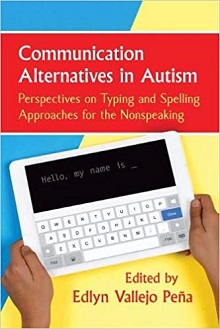2018 School Spending Survey Report
Communication Alternatives in Autism: Perspectives on Typing and Spelling Approaches for the Nonspeaking
McFarland.
Nov. 2019.
143p.
ed. by ed. by Edlyn Vallejo Peña.
bibliog. index.
ISBN 9781476678917. pap. $29.95.
PSYCH
COPY ISBN
VERDICT While limited in its scope--it only discusses these two similar forms of communication methodology--it is nonetheless incredibly valuable in that it gives those on the spectrum the opportunity to self-advocate for their own communication method. Highly recommended for parents, caregivers, educators, physicians, and specialists working with children of all ages.
RELATED
ALREADY A SUBSCRIBER? LOG IN
We are currently offering this content for free. Sign up now to activate your personal profile, where you can save articles for future viewing




Comment Policy:
Comment should not be empty !!!